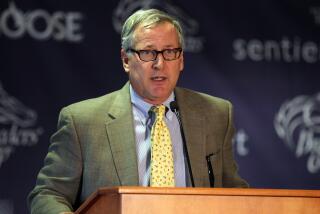Harry Gray Resigns From United Technologies Board
- Share via
Harry J. Gray, whose deal-making helped build and redefine United Technologies Corp. into a defense and industrial giant, has resigned from the company after 17 years.
Gray, who was thought to be preparing a takeover of UTC earlier this year, retired as the company’s chairman two years ago but had continued on the board. Gray would have been forced to retire from the board next November when he turned 70, the mandatory retirement age for UTC directors.
Gray said in an interview this week that his investment group, Harry Gray, Mel Klein & Partners, left him little time for UTC.
Last winter Gray teamed up with Texas businessman Melvyn N. Klein and Chicago financiers Jay A. Pritzker and Thomas J. Pritzker to raise investment capital. In January, Gray, known by corporate insiders as the “father of the hostile takeover,” denied rumors that his investment group was targeting UTC for takeover.
Gray said Monday that he was uninterested in any hostile takeover, of UTC or any other company. “Life’s too short,” he said.
Gray presided over an eightfold expansion of UTC’s annual revenue. Today, the company rings up annual sales of $17 billion.
Gray’s partnership was a co-investor in a group that lost in the feverish bidding for RJR Nabisco Inc. after raising about $550 million in capital.
Kohlberg Kravis Roberts & Co. won the battle for RJR Nabisco on Nov. 30 with a $24.53-billion bid.
“In thinking over the requirement of times on something like RJR Nabisco . . . I decided that, in all fairness to the partnership and in all fairness to UTC, we probably were going to get into time conflicts,” Gray said.
UTC’s chairman and chief executive, Robert F. Daniell, accepted Gray’s resignation on Monday.
“United Technologies will miss Harry’s advice and counsel,” said Larry Bingaman, a UTC spokesman, adding that Gray was “in large measure responsible for United Technologies becoming the company it is today.”
Gray was hired in 1971 as president of Connecticut’s largest company, then known as United Aircraft and known mainly for aerospace products such as Pratt & Whitney jet engines, Sikorsky helicopters and Hamilton Standard propellers.
He soon added the titles chairman and chief executive and changed the company’s name to reflect a move into other businesses such as Otis elevators and Carrier air conditioners.
More to Read
Inside the business of entertainment
The Wide Shot brings you news, analysis and insights on everything from streaming wars to production — and what it all means for the future.
You may occasionally receive promotional content from the Los Angeles Times.








